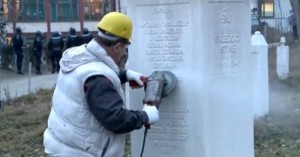
It’s been a little over 20 years since the GENOCIDE committed by the Serbs in Bosnia. They are now removing the word “genocide” from our memorials as if by removing the word they’ll be able to erase the history and the reality that they did, in fact, commit genocide. As if by removing the word “genocide” from the concrete tombstones, they’ll, somehow, be able to remove the memory of our loved ones from our hearts and minds.
No matter what you do now, the fact remains, you did commit genocide over civilians; you raped women and children and then you locked them up inside a house and burned alive!
 We will NEVER forget nor forgive! You can remove the word “genocide” from the concrete, but you can not remove the truth.
We will NEVER forget nor forgive! You can remove the word “genocide” from the concrete, but you can not remove the truth.
Let me tell you a little bit about a few people I loved and now mourn who inspired me to write Remember Me. They were all either relatives or close friends who were not as lucky as I was to survive and escape hell created by the Serbs in Bosnia. This book was written for them. They will never be forgotten.
Selma’s character was inspired by a beautiful, young girl I knew. She was happy, kind, and smart. She loved both of her parents, but her dad was her hero. Her next door neighbor did unimaginable things to her in 1992, but she survived and got out of the country. After the war, she went to The Hague, Netherlands to testify against her attacker and his friends, showing incredible courage just to be there. After going through torture of telling the court—in detail—what the monster had done to her, she believed she’d get some kind of justice. Her life was (after all) worth something to others.
However, as it turned out, her life wasn’t really worth much to anyone but her family; she received the worst news—the news that drove her over the edge, forcing her to take her own life. Her attacker, rapist, the man who held her as a slave and who brought hundreds of others like himself to rape and beat her—was sentenced to less than a year in prison. He was not charged with rape, but other inhumane acts. After all—in the courts’ eyes—this was the time of war. So Selma (not her real name) never got her “happily ever after”. She is now dead and the monster is alive and free.
Johnny’s (Džani) character was inspired by a boy I knew and loved since I figured out the difference between a boy and a girl. He was blond with blue eyes. He never seemed to notice admiring glances that were thrown his way everywhere he went. He was modest and shy. Johnny was in the same convoy that carried me from Prijedor to Travnik, August 21, 1992. He was taken out of the truck and killed in cold blood, along with about 250 other men and boys. He too, never got his “happily ever after”.
I will never be able to get rid of the memory of the last look he gave me as he was taken away, and an overwhelming feeling of helplessness for not being able to save them.
The character of Helena was inspired by a relative who was also a very deer friend of mine. She got married in 1991. When the war in Prijedor started in ’92, her baby boy was only a few months old. One day Serb soldiers showed up at her door. They took her husband and father-in-law outside where they gunned them down. They—the soldiers— then raped her and forced her and her sister-in-law to a concentration camp.
She got pregnant, but survived the torture and was helped—by one of the soldiers—to get out of the country. After the war, the man who had helped her to get out, showed up where she lived (in a different country) and took her baby-girl away. She is now mentally ill and living somewhere in Europe.
The character of Kemal was inspired by a relative. He was always so happy and childish. He was only seventeen when he was beaten to death in one of the Concentration Camps by an acquaintance he said hello to.
The character of Dana was inspired by my own—then—best friend who hung up the phone on me when I called for help when my parents and I had nothing to eat and no way of getting any food. Later, I found out, that her father and her uncle were involved in the “ethnic cleansing” they (the Serb army) did in Hambarine (my mother’s home town).
Damir’s character was inspired by an amazing person who I still love and respect.
Radovan—the monster—was inspired by a neighbor who repeatedly came over to my house, threatening my father and taking him out of our home to execute. My father survived because another one of our neighbors (also a Serb soldier) stepped in.
The inspiration for Radovan’s character is still free and living in Prijedor.
All of the people I mentioned in acknowledgments in Remember Me, were my inspiration and their stories—although switched around a bit to fit Selma’s life story—were told in my book.
Agan Kadirić was in his early twenties. We all called him Fritz because he was so fair. His blond hair was almost yellow and a little curly. He had the biggest heart of anyone I ever met. He married the love of his life (who he was courting for many years). They had a beautiful baby boy who was a few months old the last time his daddy held him.
The Serb army showed up and ordered Fritz, his father, and his brother Dado (who was also in his twenties) to go outside. When they did, they were shot to death. Fritz left behind a mother (who lost two sons and a husband in one day), a wife, and a son. Their bodies haven’t been recovered yet.
Samir Kadirić was Fritz’s cousin, also in his early twenties. We all called him Peka as a joke. Peka means something like ‘one who is conceded’, which he was not at all. He was kind, friendly, and always soft spoken. He had the greenest eyes… Peka didn’t have a chance to experience marriage or the joy of having children. He was killed the same way Fritz was and on the same day. He left behind a mother and a father, a sister and a younger brother.
Crnči’s real name was Admir. We called him Crnči because of his black hair and dark completion. He was attending college in Sarajevo at the time, however, he returned home to be with his family in 1992. He couldn’t have known that what awaited him at home was either concentration camp or death. He was killed by the Serb army the same day and in the same way as Fritz and Peka.
Mirzet Arnautović lived in Puharska (Prijedor). He was in his early twenties and married to my cousin Lela. Their baby boy was just an infant when the Serb-army showed up at their door step and killed Mirzet, his father, along with their neighbor – men and boys. Lela and their baby were taken to a concentration camp…
Ešef Ejupović was my favorite uncle of all. Ešef was in his forties and visiting his daughter in Bišćani (Prijedor) when the Serb army showed up to do the “ethnic cleansing”.
Esef, his son-in-law, and his son in law’s father were all taken away and killed. He left behind a wife, five daughters and many grandchildren.
Ziska Ejupović was my aunt. When the Serb-soldiers showed up at her door, they demanded money and jewlery. After she gave them everything she had, they shot her. She left behind a husband and three children. Her youngest was hidden in a corn field nearby witnessing the whole deadly event. He is now an adult and living with a horrible memory of the last time he ever saw his mother.
Velid Ališković was my cousin. He was in his early twenties. I am not exactly sure how he died; only that he was taken away from home by the Serb army. His mother died shortly after and his father, brother, sisters, nieces, and nephews are constantly talking about and missing him.
As I’m thinking about and mentioning all of their names, countless of others are popping into my head.
I pray that they all rest in peace.
Although, all of the people that inspired me had such horrible faiths, I had to make my book into an inspirational, love story. As a hopeless romantic, I needed it to have a happy ending. I had to, somehow, bring them back to life and so I wrote a book about them.
I will talk and write about the genocide done by the Serbs in Bosnia 1992-1995 for as long as I live and after I’m no longer here, on this earth, my books will live on forever as a reminder of the genocide done by the Serb army. The rest of the Serbs watched quietly; justifying the genocide by their silence.
May God help you on your judgment day.
Bosnian Serbs Remove ‘Genocide’ from Bosniaks’ Visegrad Memorial (Video)
“And the Book (of Deeds) will be placed (before you); and thou wilt see the sinful in great terror because of what is (recorded) therein; they will say, “Ah! woe to us! what a Book is this! It leaves out nothing small or great, but takes account thereof!” They will find all that they did, placed before them: And not one will thy Lord treat with injustice.”
